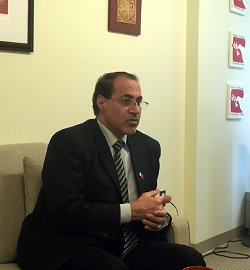This week, ADHRB caught up with Bahraini human rights lawyer, Mohamed al-Tajer, during his trip to Washington, D.C. to discuss the situation in Bahrain.
In your capacity as a human rights lawyer, can you talk about your work in Bahrain?
As lawyers, we thought that the worst situation was the martial law in 2011 and the behavior of the courts against political detainees. But during the last few years, the government has been using the legal system to banish or arrest anyone it feels poses a resistance to its measures.
Can you talk about the creation and use of anti-terrorism legislation to try activists?
During the past few years the government has attempted to extend its control over civil society by the introduction of laws and decrees that tighten its grip on civil society so that NGOs cannot function. They are not tolerating any elections that may bring opposition to any board of society — even societies of accountants or editors.
In the ministries where financial support for citizens is allocated we have seen regressive policies that limit the amount of support available to families of people who have participated in the uprising. These policies even go so far as to discriminate against Shia simply for their religion. Discrimination against Shia exists in all aspects of life in Bahrain and the government punishes them by creating new legislation and decrees and by fabricating criminal cases against them. Over the past four years, most Bahrainis have been charged either for insulting the regime, illegal gathering, for attacking police or for being accused of being members of a terrorist cell.
What is it actually like in a court room and practice law in Bahrain?
Practicing law in Bahrain, especially for human rights lawyers, has been very difficult since 2010 when there was a major crackdown before the revolution started. Lawyers are not free to adequately represent their clients, especially those who are detained for political reasons. If they anger the judiciary, lawyers even find themselves in court. The courts now freely allow policemen to control the court proceedings, going so far as to remove lawyers from the court room for doing their job.
As for the detainees, they do not have access to due process. If you read the reports about these detainees you will see that interrogations and forced confessions are typical. There is also a high rate of torture, night raids, confinement, trials with no solid evidence, no true witness, and judges who will take testimony from a government official but ignore the testimony of a defense lawyers.
Most detainees are convicted whether there is evidence or not. These types of cases would never stand anywhere else, but they do in Bahrain and people are in jail because of fabricated stories.
What are your recommendations for judicial reform?
Unfair trials will continue in Bahrain until the judiciary is independently run. Independent means that it must be separate from the executive powers. Judges should be qualified; elected by exams, not based on their loyalty, family, or their relation to ministers. If you want fair trials, better outcomes, and an independent system you have to change how judges are appointed and trained.





